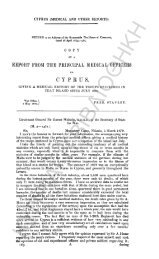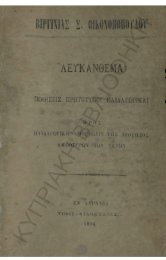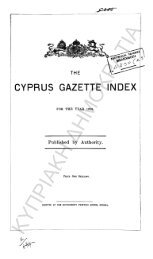THE CYPRUS GAZETTE
THE CYPRUS GAZETTE
THE CYPRUS GAZETTE
- No tags were found...
Create successful ePaper yourself
Turn your PDF publications into a flip-book with our unique Google optimized e-Paper software.
172 <strong>THE</strong> <strong>CYPRUS</strong> OAZETTE ^EXTRAORDINARY), llth JUNE, 1918.Onsompolousmeroh»nt8.Farmers wfaenin power ofmoney lender.Oomplainte ofvillagen.Ooorae ofbusiness.They incur debts to buy property which they cannot pay, sometimes toprovide dowries for their children in an extravagant way, and doubtless inother ways they are improvident and unbusinesshke.They are improvident in that they keep no account of the quantity orvalue of the things supphed to them, or dehvered by them, they make noproper provision for the pajrment of their debts, or even for the payment ofthe interest on the money they borrow, and are content to let the amount ofthe debt mount up with 12% compound interest, as long as the creditor willallow it.They are reluctant to carry out their obhgations as appears from theevidence of Mr. B. Amirayan. However honest the merchant may be, insolvencyis bound to result from such improvidence and unbusinesshke methodfi.Naturally merchants are found who see no harm in taking advantage ofthe improvidence of these people; merchants who give facihties to thefarmers and make gain out of their ignorance. Such merchants get controlof the whole village trade and bring many into debt. Farmers who, if theydealt with merchants content with ordinary trade profits, might do well,are encouraged to run into debt, and encouraged to let their debt run on,until eventually they are so deeply involved that they cannot meet theirobhgations.In some cases the farmer is unable to meet his obhgations, although hisproperty may be worth more than he owes. He is unable to pay his debtsbecause he has no liquid assets. His capital is in his immovable property,and he cannot turn it into cash except at a ruinous loss. It is when he is inthis state that the village merchant or money lender gets him in his power,as completely as though he were insolvent.The main complaints of the villagers are about the treatment wliich theyreceive when they have been reduced to this state.We have diflficulties in deahng with these complaints so far as they constitutecharges against specified persons, because most of the villagers werereluctant to speak, except on the understanding that what they said wouldnot be divulged, because they feared to incur the hostihty of their creditors.We, therefore, pass over all complaints, except such as are confirmed by theevidence of merchants.The village merchants have frankly admitted that the deahngs to whichwe call attention are practised in their business relations with the villagers.The wealthier merchants and the Members of Council, whom we havehad the advantage of interviewing, also confirmed the fact that the evils, ofwhich complaint is made, exist, but stated that they are confined to deaUngsbetween the village merchant and the villager.This would appear to be true, because the wealthier merchants, so far aswe have been able to ascertain, have few, if any, direct deahngs with thevillager. Moreover these merchants were quite as insistent as the Membersof the Legislative Coimcil on the necessity of a reform of the law to protectthe villagers.To understand these complaints it is necessary to explain the method ofdeahng which is in force between the villager and the merchant.The course of business is for the farmer to draw on the merchant for moneyand supphes, and in repayment to dehver to the merchant his produce.Sometimes the farmer is under express contract to dehver his produce to themerchant. If there is no express contract, he is obhged to do so, otherwisethe merchant can press for payment of his debt, and the farmer being unableto find the cash may be sold up and ruined.The farmer complains that being under the obhgation to deal with themerchant, he does not get fair treatment.He says (1) that the weighing of produce is not properly carried out ondehvery to the merchant, (2) that he does not receive a fair price, (3) thatΚΥΠΡΙΑΚΗ ΔΗΜΟΚΡΑΤΙΑexcessive interest is charged on money and the price of supphes advancedto him.
















